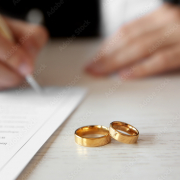Pre-nups: 4 Good Reasons Why You Need One
What is a Pre-nup?
A prenup (also known as a prenuptial agreement or premarital agreement) is a legal agreement between two people who are planning to get married, which sets out how they have both agreed to divide their finances in the event of a divorce or separation. The purpose of the agreement is to protect certain assets for example non-matrimonial property such as gifts, inheritances, business interests and assets owned by either party before the marriage.
As the document is an agreement between you and your partner, you will need to have an open and honest discussion with your partner about what you both want to achieve from the agreement and which assets are to be protected.
We know it can be a difficult conversation to have, and no one wants to think about the prospect of divorce whilst planning a wedding, but by taking this step you are providing clarity and certainty if the marriage breaks down.
Why do I need a Pre-nup?
- they often avoid lengthy legal battles as an agreement has already been reached which will reduce acrimony, costs and stress in the long term.
- they provide clarity and certainty on what will happen in the event of a divorce as you have already agreed how your assets are going to be divided.
- they aim to protect assets that you are going to inherit in the future such as business assets and property.
- in the rural community, farms are often passed down through generations so a prenup can assist in ensuring that the farm remains in the family in the event of divorce.
How does a Pre-nup protect me?
Under the law in England and Wales, whilst not legally binding, prenuptial agreements are very persuasive and can often change the initial starting point for the division of assets. They are given significant weight in financial proceedings as long as the agreement is considered to be fair and reasonable and satisfies the legal requirements.
A prenup also assists the Court by demonstrating what both of your intentions were at the time of marriage and there will be a presumption that you both intended to be held to it’s terms.
What is fair and reasonable?
- The prenup must not prejudice the reasonable requirements of any children (where appropriate).
- The agreement must meet both of your needs. If the agreement would leave either one of you with less than you need, whilst the other is comfortably provided for, this is likely to be considered unfair.
- There is nothing inherently unfair about protecting or ‘ringfencing’ non matrimonial property, e.g. inheritance.
- The longer a marriage lasts, the greater the chance that a Court may not find it is fair to hold you both to the terms, because of changes in circumstances. Therefore, a prenup should be reviewed every 5 years or when there is a significant change of circumstances, such as the birth of a child.
We will advise you on fairness at the time of preparing the first draft of the agreement but generally the above situations are factors the court will consider when assessing reasonableness.
Do I have to disclose my assets?
Yes – the requirement for full and frank financial disclosure is an essential part of creating a legally valid prenuptial agreement. It ensures that you have both made decisions and entered into the agreement with transparency and fairness between you both and helps to prevent challenges to the agreement in Court.
What is the process?
- We will have an initial chat with you to discuss your circumstances and find out more about you and what it is you and your partner are seeking to achieve.
- We will ask you to complete a schedule of income, assets and liabilities identifying property, savings, business interests and pensions.
- We will use the information provided to prepare a first draft of the agreement and we will discuss this with you.
- Once you are happy with the draft, we will send a copy to your partner. We strongly recommend that they obtain their own independent legal advice.
- Their solicitor can take instructions from your partner and liaise with us directly with regards to any amendments before finalising.
- Once agreed, the document will be signed before an independent third party witness at least 28 days before the wedding.
For more information and on prenuptial agreements and obtain a fixed fee quote, please get in touch with Holly or Mercedes.



